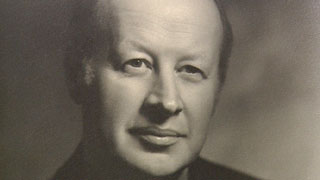
Sir Eugene Aynsley Goossens (26 May 1893 – 13 June 1962) was an English conductor and composer. He was born in Camden Town, London, the son of the Belgian conductor and violinist Eugène Goossens (fils, 1867-1958) and the grandson of the conductor Eugène Goossens (père; 1845-1906). (Note: His father and grandfather spelled Eugène with a grave accent; he himself did not.) He studied music at the age of ten in Bruges, three years later in Liverpool, and in 1907 in London on a scholarship at the Royal College of Music under composer Charles Villiers Stanford and the violinist Achille Rivarde among others. He won the silver medal of the Worshipful Company of Musicians and was made associate of the Royal College of Music.
He was a violinist in Thomas Beecham's Queen's Hall Orchestra from 1912 to 1915 before coming to attention as Beecham's assistant conductor with a performance of Stanford's opera The Critic (1916). In 1921 he decided to make conducting his career and founded his own orchestra. He gave the British concert premiere of Igor Stravinsky's The Rite of Spring on 7 June 1921 at the Queen's Hall with the composer present.
For nearly a quarter of a century, he accepted positions at U.S. orchestras. At the invitation of George Eastman he was conductor of the Rochester Philharmonic Orchestra from 1923 to 1931. This post also involved teaching at the Eastman School of Music. From 1931 to 1946 he succeeded Fritz Reiner as the conductor of the Cincinnati Symphony Orchestra. In a tribute to Goossens on his departure for Australia, nine American composers collaborated on Variations on a Theme by Eugene Goossens, for orchestra. The composers were Ernest Bloch, Aaron Copland, Paul Creston, Anis Fuleihan, Roy Harris, Walter Piston, Bernard Rogers, Roger Sessions and Deems Taylor, with Goossens himself writing the finale.
Goossens spent nine years in Australia, from 1947 to 1956. He conducted the Sydney Symphony and other groups, and was the director of the NSW State Conservatorium of Music. He held these positions concurrently until March 1956, when he was forced to resign after a major public scandal, only a year after being knighted. His former student Richard Bonynge visited him near the end of his life, and found him "absolutely destroyed". Nevertheless, he was engaged for work with the BBC and Everest Records asked Goossens to make some stereo recordings. For Everest he completed a powerful recording of Respighi's Feste Romane just before his death and it was released as the sole selection on the LP. He died of rheumatic fever and a haemorrhaging gastric ulcer on 13 June 1962 at Hillingdon Hospital in Middlesex. He was buried in St Pancras and Islington Cemetery. He left his estate including copyrights and royalties to "to my faithful companion and assistant Miss Pamela Main".
Robert Schumann: Symphony no 4 in D minor, Op. 120 Cincinnati Symphony Orchestra
Eugene Goossens
Rec.: 1946
| 
